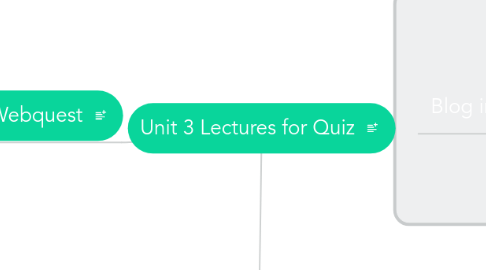
1. Webquest
1.1. the essence of WebQuests lies in the given task which requires a higher order of thinking
1.2. 3 contributions on students learning
1.2.1. developing critical thinking
1.2.2. increasing students’ motivation to learn through the challenge of confronting authentic tasks
1.2.3. creating an opportunity for collaboration
1.3. Why?
1.3.1. many students lack the skills to find, critically evaluate and intelligently exploit web-based resources
1.4. Who?
1.4.1. developed in America by Bernie Dodge in 1995
1.5. What?
1.5.1. Authentic Task that requires critical thinking
1.5.1.1. Make comparison
1.5.1.2. Solve a problem
1.5.1.3. construct a hypothesis
1.6. Types?
1.6.1. Short Tem
1.6.1.1. within less than two or three lessons
1.6.1.2. limited amount of new information
1.6.2. Long Terms
1.6.2.1. a week or a month’s period
1.7. How?
1.7.1. The teacher has to
1.7.1.1. conceivem
1.7.1.1.1. how the task supports the syllabus?
1.7.1.2. design
1.7.1.2.1. Adapt one?
1.7.1.2.2. Create one from scratch
1.7.1.2.3. the primary resources need to be found on the Internet
1.7.1.2.4. avoid unnecessary and time-consuming searches
1.7.1.2.5. give enough time for students to analyze, critically evaluate and assess the collected information i
1.7.1.2.6. Providing explicit criteria informing the students about the evaluation process
1.7.1.2.7. The task should be discussed in teaching team meetings
1.7.1.3. implement
1.7.1.3.1. Teacher is only a facilitator, (question students)
1.7.1.3.2. Students are responsable for learning
1.7.1.3.3. schedule for students to plan their study in terms of where to work, when to work, and with whom
1.7.1.3.4. Computers with internet access and sound cards, and speakers
1.7.1.3.5. Ideally it should be publish on Internet as a web page
1.7.1.4. and evaluating
1.7.1.4.1. Providing explicit criteria informing the students about the evaluation process
1.8. Must Have
1.8.1. 1. An attractive introduction in order to create curiosity
1.8.2. A clear statement of the purpose to help students to keep on track (i.e a focus question)
1.8.3. Resources in the form of a list
1.8.4. A guide, the process to achieve the task should be selfexplanatory
1.8.5. Provide the rubric
1.9. Examples
1.9.1. Preparing a Print Media Advertisement
1.10. This is process-centered learing. what it is important is the process and not the project
2. Wikis in TEFL
3. Blog in TELF
3.1. It is important to post reading materials according to learners abilities
3.2. It is important to check if student are familiars with blogs or not, if not, the blogging activities should be done during the class
3.3. Downsides
3.3.1. students rarely posted entries on their blogs.
3.4. Positive
3.4.1. Have the potential for developing reading and writting skills
